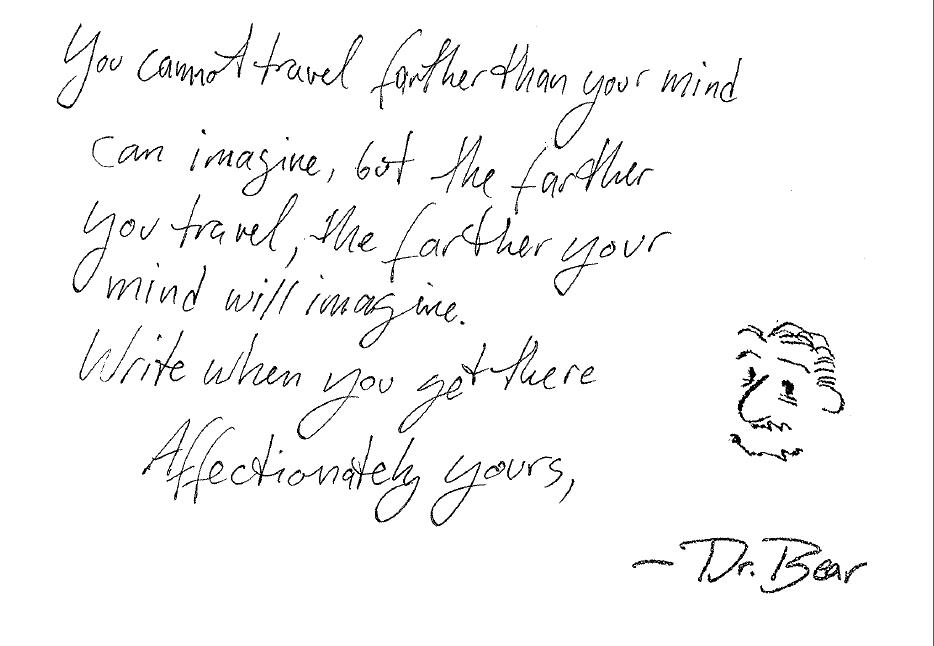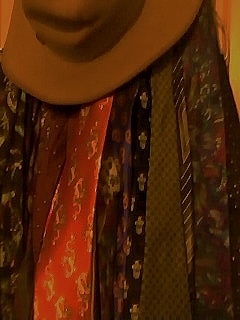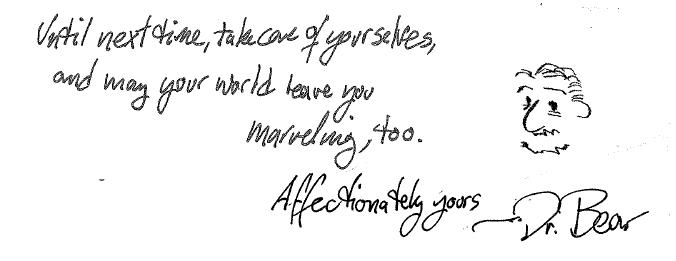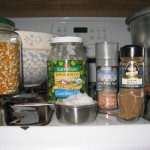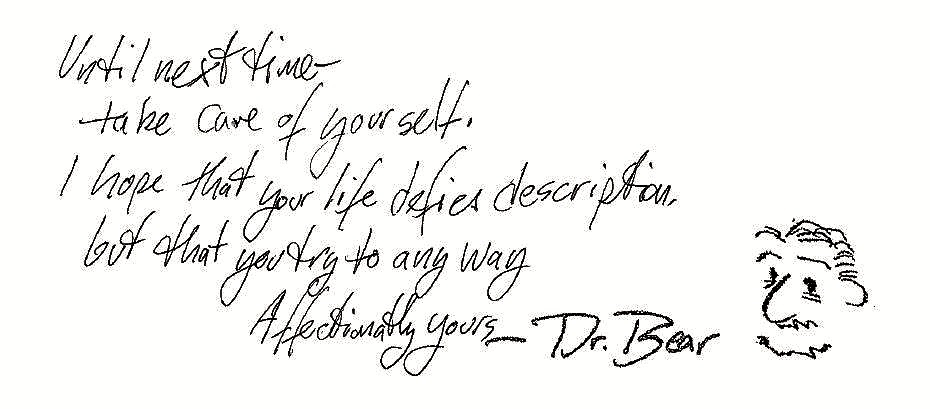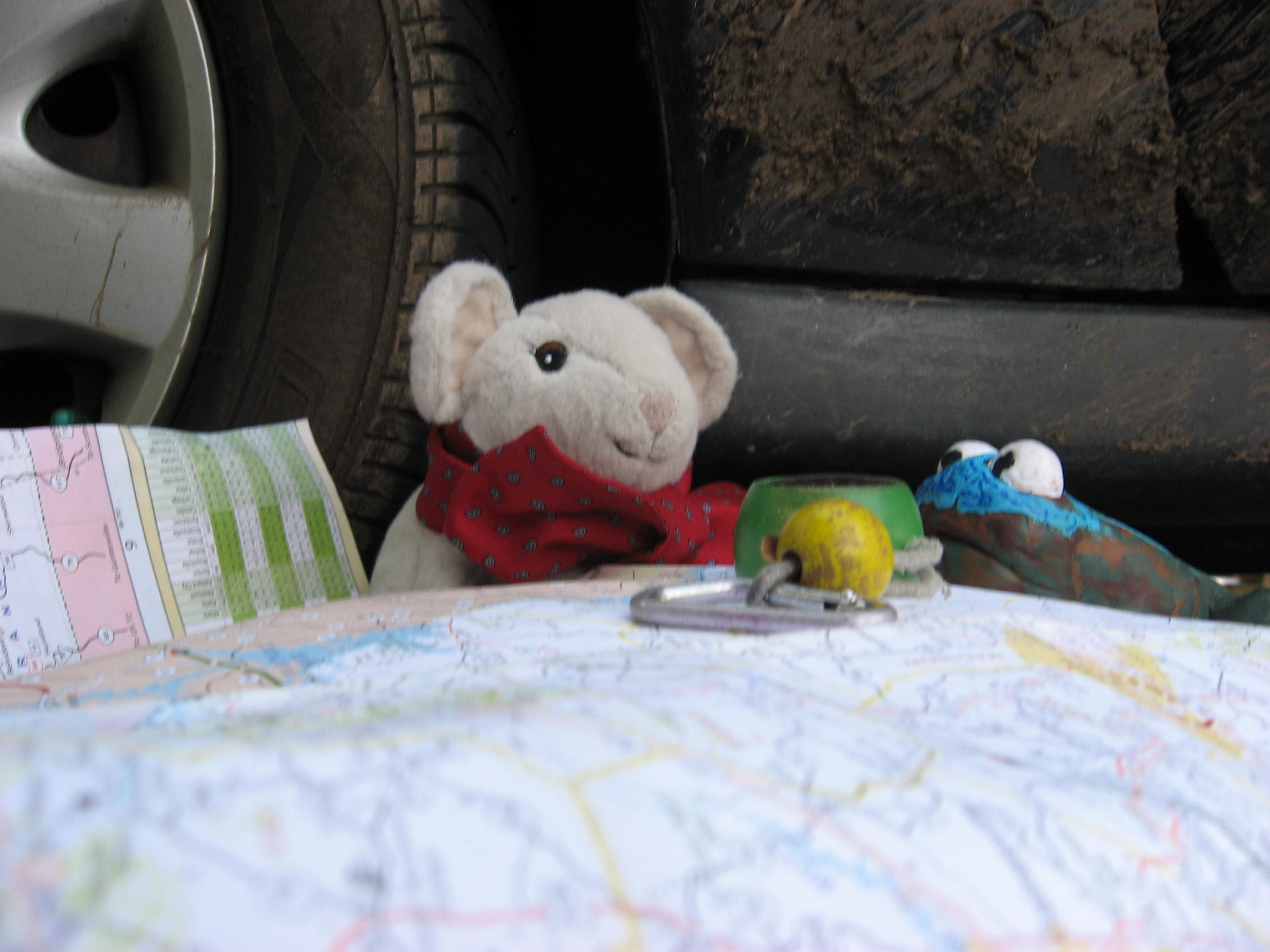 We have hit the road! Going on a great American adventure.
We have hit the road! Going on a great American adventure.
Allons!
Author Archives: Dr. Bear
Bird in his place
As I sat at a table behind the empty Sunday-morning café, a bird flew and perched up on a street light. It is fascinating how each type of bird, and each bird itself, can have such individual personality. A beautiful light gray mockingbird, he was slender, but cocky, prince of his little realm, throwing his head back to sing, and then looking down at his kingdom—and then he flew away.
I looked around, and there was not a another bird in sight
I am alone, I thought, not another living being.
But the maples down by the creek, and the other trees, they are living beings…so was the roll of grass between us, and the Virginia creeper climbing up the trees, and the scrub and weeds and bushes on the bank behind the trees.
And the cars buzzing past beyond—in each of them a living being: every one, all of them with their own destination, their own fears, their own joys, their own desires, their own cares, their own jokes.
The crazy little mockingbird comes back and looks at his little realm.
Oxford
I am tempted to say that the whole European travel last summer was magical, but that is not the best term. It was so very real. The most wonderful places amazed us by just being themselves–so very themselves.
Although Cambridge has been the British University for philosophers, I adore Oxford.
Every moment the town is alive and vibrant, yet mellow and thoughtful. Most of the stones have been there since the Tudors and Stewarts, yet each year a new wash of young students pour over them.
I fell in love with Oxford as a young boy.
As I have mentioned before, we were living in Germany, and my parents were sometimes afraid we would forget the English language, so we would go to England once a year. They would take me to Blackwell’s, a very fine, very old bookstore on  Broad Street. It seemed like the biggest bookstore I would ever see, which meant it was the best possible place in the entire universe to be.
Broad Street. It seemed like the biggest bookstore I would ever see, which meant it was the best possible place in the entire universe to be.
Oxford, by contrast, is a university town (as, by the way, was my home, Tubingen). Being a university town means being aware of a lot of students, but also being aware of the place as a place where people come to learn and to think. There is no reason to pretend that you are not Oxford since Oxford is the place to be.
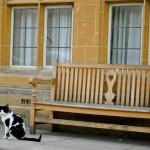 Oxford is a university, but that university also consists of a federation of 38 quasi-independent colleges, such as Trinity College, Merton College, Balliol, etc. One of our nights there, we had the good fortune to sleep in Mansfield College.
Oxford is a university, but that university also consists of a federation of 38 quasi-independent colleges, such as Trinity College, Merton College, Balliol, etc. One of our nights there, we had the good fortune to sleep in Mansfield College.The Porters’ cat is named Erasmus.
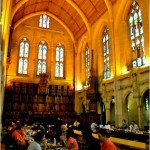 The breakfast was amazing.
The breakfast was amazing.
I have already told the Oxford story involving the surrealism of the marching band playing YMCA, but the walk that more than anything told me what was possible in Oxford was a few nights later. We had eaten supper and The Eagle and Child–hangout of the Inklings–had walked across and behind St Giles to cut down Keble Road and east.
Keble College amused my daughter no end–and she would still laugh about it for days. A guide book I had read described Keble and having “Brick like an ugly Christmas sweater,” and that may be an apt description. In general, the gargoyles of Oxford are droll and funny–the stone masons clearly had a sense of humour and several pints  inside them–but Keble has the funniest. The expressions of these fantastical stone creatures had us laughing out loud until we reached Parks Road.
inside them–but Keble has the funniest. The expressions of these fantastical stone creatures had us laughing out loud until we reached Parks Road.
We spent some time in the park–Oxford has huge amounts of green space. Like any good University town, there were plenty of students making the best of the last of the day’s sunshine.
As we walked back on Parks Road, we passed a huge beautifully made iron gate–the Parks Road Gate of Trinity College, leading into “The Lawns.”. On the other side were lawns and gardens, and a company performing Pride and Prejudice.
Mrs. Bennet: Have you no consideration for my poor nerves?
Mr. Bennet: You mistake me, my dear. I have the utmost respect for your nerves. They’ve been my constant companion these twenty years.
 A block further, we passed the courtyard of the Bodlean Library, where the Royal Shakespeare Company was performing Taming of the Shrew. Going behing the library to the Radcliffe Camera, we sat on a worn stone stair and listen to a baroque concert.
A block further, we passed the courtyard of the Bodlean Library, where the Royal Shakespeare Company was performing Taming of the Shrew. Going behing the library to the Radcliffe Camera, we sat on a worn stone stair and listen to a baroque concert.
Austin, Shakespeare and Handel within a ten minute walk, one of the finest bookstores of the world, all surrounded by  parks and old trees, as well as beautiful old buildings–what more could one need?
parks and old trees, as well as beautiful old buildings–what more could one need?
Well, obviously, tea, but Oxford has that as well.
Rags
The week’s writing.
I’ve written this week;
all the writing was private,
but not this haiku:
Signals, Self-expression, & Sharing
a rant turned into a meditation turned into philosophy.
seriously?!? would it kill you to use your flogging turn-signal????
I don’t know if it is a sign of the decline of Western Civilization in general,  or just where I live, but apparently many drivers no longer feel obligated to signal that they are going to change lanes, and quite a few feel no obligation to do so when turning.
or just where I live, but apparently many drivers no longer feel obligated to signal that they are going to change lanes, and quite a few feel no obligation to do so when turning.
I don’t understand this.
You can share almost anything, but this information you have to keep to yourself?
You can send selfies to the whole blasted planet, but you can’t tell me you are turning?!?
We live in a time of tremendous self-expression. Every day, folks share things online that I cannot imagine sharing with anyone, let alone with strangers; in fact, people share personal information with me in check-out lines, or as I am helping them at work, or when I just happen to sit near them. Sex lives, religious lives, prostate surgery, difficult child-birth, bowel status, getting kicked out of rehab–I have been bombarded with all this information, and yet, some how, I cannot get information that I really could use.
At work, of course, I learn something new every day, and usually it’s something that 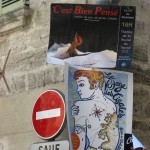 would have been much more useful earlier. The sad thing about this is that there usually is someone who could have shared it with me, but didn’t. But of all the things that could be shared, the one that frustrates me on a daily basis is when you don’t share the fact that your car will turn before it reaches me, and that I don’t need to wait for it. Or that you are about to turn into my lane directly in front of me.
would have been much more useful earlier. The sad thing about this is that there usually is someone who could have shared it with me, but didn’t. But of all the things that could be shared, the one that frustrates me on a daily basis is when you don’t share the fact that your car will turn before it reaches me, and that I don’t need to wait for it. Or that you are about to turn into my lane directly in front of me.
See, here is the thing about turn signals, kids: it’s not about you. You don’t signal as a form of self-expression, or because it is a law (yes, it is) and you are afraid of a ticket, the signal is a sign put out there for other drivers. I recognize that there really isn’t anything in it for you–neither profit if you do nor punishment if you don’t–and this really effects your memory and concentration. However, maybe it should. It is something the other drivers who are sharing the road might want to know, and it makes their commute just a little less frustrating, so signaling shows that you are a reasonably good person, and failing to do so shows that you are an inconsiderate little Schmendrick.
Why? It is such a little thing that doesn’t make much of a difference.
That, my dears, is how worlds are lost. Besides, if you can make another human being’s day just a little bit easier with just a little flick of one finger, but you fail to do so, what kind of Schmo are you?
That little flashing light is a signal, which means it works as a sign.  Peirce, our literary penguin, could tell you quite a bit more about signs, since he was named after one of the world’s greatest semiologists. This is a very complicated field, and both Peirces would probably disagree with me.
Peirce, our literary penguin, could tell you quite a bit more about signs, since he was named after one of the world’s greatest semiologists. This is a very complicated field, and both Peirces would probably disagree with me.
However, the point we need to remember is that in this case a sign communicates between us–you and me. It allows us to share something–warning, commands, information, affection; we meet in the clearing that sign creates.
We are sharing.
Although we say “thanks for sharing” facetiously when someone over-shares, really they aren’t sharing; they are blathering on. Because we value self-expression (and because dime-store freudianism somehow convinced us that talking about ourselves lead to better mental health), we do talk a lot. However, this isn’t really sharing.
Sharing involves both of us. We establish a connection; we connect. The hyper-sharing of on-line self-expression may seem intimate because one is throwing intimate information out there, but it is not intimate; intimacy involves two or more people connecting.
Without sharing and connection, self-expression is just as empty as any other form of intimacy without them (even if all these forms of false intimacy might seem or even be pleasurable).
The turn signal shows consideration and concern about others; the rest is just silly, crazy bumper stickers. One is attempting to connect; the other is just self-expression.
I could include the Bistro in this.
Now, I have rarely been accused of sharing too much personal and intimate information about myself, but my writings at the Bistro are often just talking to you as if I were just talking to myself, my dearest guests.
(of course, you could change that by writing questions to me)
In the mean time, I do hope you end your days with something warmer and more substantial.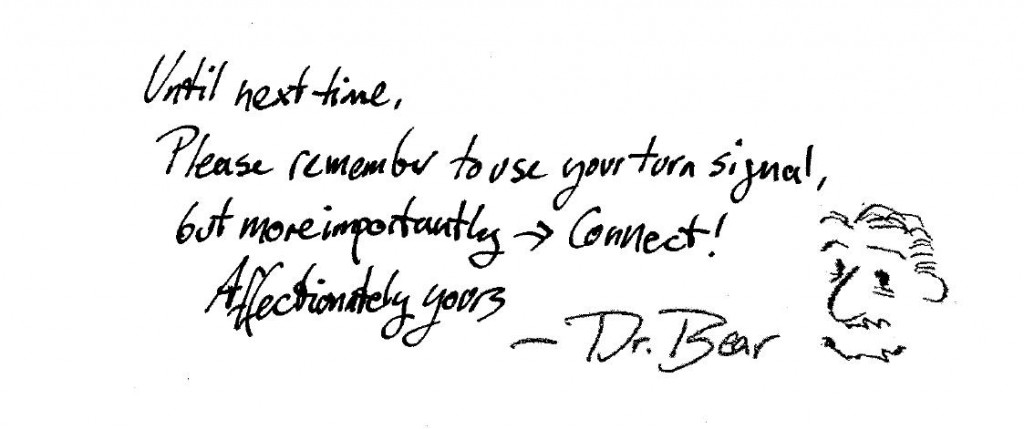
PS: You could always write. That would be a connection.
How to live life.
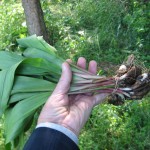 Oh my gosh! These ramps are amazing! I wonder what I can do with them?
Oh my gosh! These ramps are amazing! I wonder what I can do with them?
Scott’s strawberries are in! Will the pint even make it home? If I buy two, they will last until I whip whipped cream.
Whoa! Blackberries! Marvelous! I wonder how these would be in scones?
Asparagus? Sweetness! Oh, the little tender ones are the best!
Oh my goodness! Blueberries? Incredible! Ambrosia itself!
Wow! The first peas! I could just sit in the sun, shell them and eat them raw!
The first real tomato of the season. Feel the warm smooth skin against your lips, the pop as your teeth break through, and then the flood of sweetness and tartness and acid and pulp that fills your mouth. I wonder if vampires feel like this?
against your lips, the pop as your teeth break through, and then the flood of sweetness and tartness and acid and pulp that fills your mouth. I wonder if vampires feel like this?
Is there another? With some cheese, some fresh bread, some basil and some olive oil, I could live on just these for the rest of the summer and die happy!
Hot Dog! Fresh cucumbers! Amazing how they taste cool even in the sun!
Grand! Corn on the cob right off the stalk! I don’t even need butter. Oh wow.
Hmmmmmm. I had forgotten what fresh watermelon was like.
Apples! They even smell like fall! Incredible!
New wine?!? Fan-freakin’-tastic! Let’s bake an onion torte like in the old country!
Lovely! Just lovely! There really isn’t anything quite like warm apple butter on freshly baked bread and a cup of tea on a rainy day.
Pumpkin seeds! Fresh roasted pumpkin seeds! Brilliant! Better than hallowe’en 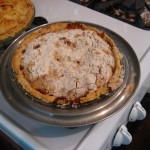 candy!
candy!
Oh-my-gosh-oh-my-gosh-oh-my-gosh!!! Shoe fly pie?
I could live on this! Did you make me two?
Outstanding muffins, if I do say so myself! I’ll have to mail some to Josie.
I couldn’t say which was my favorite Christmas cookie; they are all so magnificent!
Ausgezeichnet! There really isn’t anything that makes me feel as good as stew with friends on a stormy January night.
What shall I bake for Valentine…. yeah. hell yeah. This will be even better 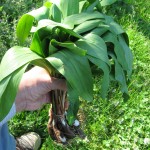 than last year.
than last year.
Ramps! Grand! How Grand! What should I do with them?
Ramp and Spinach Salad
 This is a spring salad made with ramps and spinach, and a sweet vinaigrette
This is a spring salad made with ramps and spinach, and a sweet vinaigrette
I mentioned ramps last year at this time–clearly around this time, since they are seasonal. Allium tricoccum is a wild plant of the garlic family, but I would describe it as garlic onion in flavour, strong for a leek, but not strong enough for garlic. It grows wild in the mountains of East Tennessee, and can be used as flavouring , or as a dish itself. It has wide leaves, like Lily of the Valley, so it is often stewed as a green.
Step 1, come together: assemble and wash all the ingredients–wild ramps are often found in creek areas, and the mud on the roots can retain that swampy smell.
Step 2, tear the greens: tear the spinach to a bite size and cut the leaves off the ramps, and cut into ribbons smaller than the spinach (a little goes quite a way)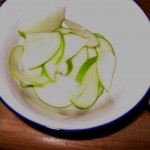
Step 3, all the other fruits of the garden…: slice a tart, crisp apple thinly, into bite sized slices, and drizzle with lemon juice. This will keep it from rusting. Add to greens.
Step 4, release the vinaigrette: in a large bowl, mix the vinegar, the dipping sauce & the olive oil (I used about a quarter cup of each, but you can balance it as you wish). 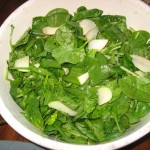 Add salt to taste. Whisk to an even emulsion and drizzle on the salad.
Add salt to taste. Whisk to an even emulsion and drizzle on the salad.
Step 5, to table: serve, share, take to a potluck, eat lots of it and go to a sauna as a spring cleanse. You know what to do.
Alternative Popcorn
Ok, so this will not be complicated, but it is unusual (not to mention tasty) and if it is too easy, just come up with your own variations.
- Popcorn
- Coconut Oil
- Salt
- Garam Masala spice (one of those spice combinations like curry which has hundreds of regional or individual variants, but generally roasted and ground turmeric, pepper, cloves, cinnamon, cumin seeds, and cardamom)
Step 1, well begun is half won: assemble the ingredients and get out a popcorn pan. A large pan with a lid and a handle will do, but remember you have to shake it back and forth to keep the kernels moving.
Step 2, beginning: melt the coconut oil in the pan. I used about a quarter cup, which is a lot, but gives it a faint coconut aroma.
Step 3, now you’re cooking with gas: roast the pan over medium high heat, keeping the corn moving until it is all popped.
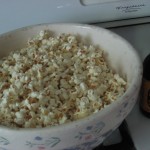 Step 4, ’tis the season: sprinkle to taste with the spice and salt–I prefer lightly.
Step 4, ’tis the season: sprinkle to taste with the spice and salt–I prefer lightly.
Step 5, enjoy & share: serve to friends for movie night, or just as a late snack, or maybe as snacks before the meal with cocktails. You can also put it in a paper bag and surprise someone with it.
Millennials
Occasionally, I read something about the Millennials.
This is a term used to describe people who have grown up on one side or the other of the year 2000. Generally, they are categorized as being very technological, or as 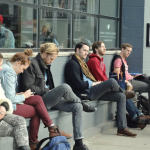 spending time on facebook (really? still?) or instagram (more likely) or other networks. Pew Research described them as “detached from institutions and networked with friends.” They are more tribal or more global, more self-centered or more public works minded (how they are both mystifies me). They can be narcissistic and feel entitled, they never grow up, they volunteer and are community conscious. They aren’t as polite or respectful as they ought to be. They live with their parents, and on and on and on.
spending time on facebook (really? still?) or instagram (more likely) or other networks. Pew Research described them as “detached from institutions and networked with friends.” They are more tribal or more global, more self-centered or more public works minded (how they are both mystifies me). They can be narcissistic and feel entitled, they never grow up, they volunteer and are community conscious. They aren’t as polite or respectful as they ought to be. They live with their parents, and on and on and on.
My main observation is that they are younger.
They are mostly in their 20s and 30s.
They have the qualities most people that age do: a desire for authenticity (although not as good a BS detector as they think they do), an ambivalence towards the previous generation’s interests and institution, an absorption–not exactly self-absorption, but an focus upon their own priorities, and a lack of interest in ours.
They are different than previous generations.
They tend to move more freely with and within technology, but it is more of a tool–like a pen or a telescope–than an object in itself.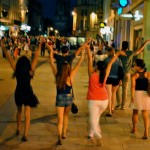
They are sometimes more inked, pierced of plugged, and have their own music. But even the things I have just described aren’t universal or defining: Some are technological, but some are luddite fixies while some are never disconnected, and most are somewhere in between. Some are urban, or even live in the artificial worlds of steam-punks and furries, but some are growing beards and returning to farming. They have their own music, but for some it might be country, some Rap, some traditional Jazz, some Old Time with strings and banjos, so they do not share this music as a group. Each little part of Millennial reality has its own furniture.
Most of all, they are human beings, just like any young adults have been and will be.
Studying ancient texts, one of the great constants is complaining about younger generations. It comes up at Socrates trial: the problem that youths don’t trust the  traditional institutions; they are drawn to new ideas and are narcissistic and would rather hang out with their friends than work hard. Narcissistic, pleasure seeking, disrespectful of traditional authority and unwilling to become involved with it–that describes the Baby-Boomers, Generation-X, the Jazz Age, almost any Generation. (Well, it really does describe my generation pretty well, the disrespectful Me-Generation of Reaganite Neo-Cons, Wall Street “Greed is Good,” Bonfire of the Vanities, giving up on “Causes” and instead looking for designer jeans and drugs–or just looking for the comfort of the suburbs.)
traditional institutions; they are drawn to new ideas and are narcissistic and would rather hang out with their friends than work hard. Narcissistic, pleasure seeking, disrespectful of traditional authority and unwilling to become involved with it–that describes the Baby-Boomers, Generation-X, the Jazz Age, almost any Generation. (Well, it really does describe my generation pretty well, the disrespectful Me-Generation of Reaganite Neo-Cons, Wall Street “Greed is Good,” Bonfire of the Vanities, giving up on “Causes” and instead looking for designer jeans and drugs–or just looking for the comfort of the suburbs.)
Yes, this young generation has its own qualities, but each individual in it has their own qualities, their own aspirations, their own needs, their own quirks.
The Doctor dislikes categories.
I really dislike them when applied to human beings.
I especially dislike categories when those human beings have little choice in their categorization.
Labels and categories are a lot of things. Some of them are conceptually handy, but most of them bad. However, one of the main things a label or a category can do is define a fellow human being as “other.” This is the alienation of categories. 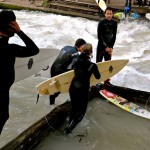 To understand someone as other–the second sex, the minority, those GLBT who won’t hide–is to create a distance between “them” and “us.” This distance is a way of not trying to see how connected we are, or even how alike we are; “us” are in this Venn Circle and “they” are way, way, way over there in their own fence. It allows “us” to distance ourselves from “them,” and to deal with them as if they were an aberration. It gives us an excuse not to care about “them,” and not to be too curious about “them,” because we couldn’t even understand them if “we” tried.
To understand someone as other–the second sex, the minority, those GLBT who won’t hide–is to create a distance between “them” and “us.” This distance is a way of not trying to see how connected we are, or even how alike we are; “us” are in this Venn Circle and “they” are way, way, way over there in their own fence. It allows “us” to distance ourselves from “them,” and to deal with them as if they were an aberration. It gives us an excuse not to care about “them,” and not to be too curious about “them,” because we couldn’t even understand them if “we” tried.
We can ignore the fact that each generation is made up of our brothers and sisters, our friends, our co-workers, our students, our children.
The danger to those living with the category is that humans internalize categories, and will come to see themselves in terms of that label–will become colonized by it. This is the tyranny of categories. Being saddled with a category leaves people between 20 and 35 with few choices: either these individuals conform to the Millennial image and internalize it, or they become odd and few exceptions to the rule–weirdoes–no matter how many of them there are.
Good thing they don’t trust authority or institutions.


